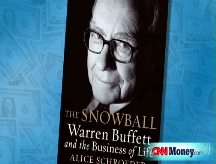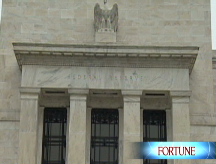Answers voters deserve
Both candidates should be ready to answer tough questions on how they'd handle the crisis.
NEW YORK (CNNMoney.com) -- The reset button has been pushed on the global financial system - and that changes everything for the next president.
The expected results: a sharp slowdown in worldwide economic growth in 2009 and a lot of frustrated investors and workers.
Indeed, some economic experts, like Desmond Lachman, a resident scholar at the American Enterprise Institute, equate the challenges facing the next president to those encountered by Franklin D. Roosevelt when he took office in 1933.
But you wouldn't have guessed that listening to many of the candidates' responses at Tuesday evening's debate in Nashville.
To many crisis-related questions, the candidates managed to work in pitches for their plans to reform health care and address the country's growing energy challenges.
Both are absolutely important issues, but they're not exactly the solution to the problems threatening to place a stranglehold on the federal government's time and money - to say nothing of U.S. economic prospects - for the foreseeable future.
To be sure, the candidates acknowledged the economic crisis facing the country.
For example, McCain announced that he was now in favor of the government buying mortgages of borrowers facing foreclosure, and he reiterated his stance that spending cuts are the answer to many problems. Obama, for his part, reiterated his call for another economic stimulus package aimed at the middle class and said lawmakers have to ensure the oversight and taxpayer protections built into the financial rescue plan are well enforced.
The candidates are in a tough spot - part of their job is to offer forward-looking, growth-oriented programs that they believe will improve the lives of voters. But any president worth his salt also needs to level with the public about what they're in for and how he's going to handle it.
With that in mind, the candidates should address - with specific answers - a host of questions critical to the economic well-being of the country. Here are just a few.
The Treasury secretary will be central to the next administration. Treasury Secretary Henry Paulson has been the main architect of the Bush administration's response to the mortgage meltdown and the resulting credit crisis. Most notably, he proposed the core of the $700 billion financial rescue plan.
McCain said it's important to choose a Treasury secretary in whom Americans have trust and confidence. Obama said the post should be filled by someone with an eye on the welfare of the middle class, and in particular on jobs and incomes.
They both seemed to agree that renowned investor Warren Buffett "would be a pretty good choice," as Obama put it. Buffett has said he's a fan of Paulson. Might either candidate ask Paulson to stay on for some period? And if not, who else is on their short list?
Would they ask FDIC Chairman Sheila Bair to stay on? She's been instrumental in negotiating the acquisition of failing banks to minimize the government's cost and was virtually alone in official Washington a year ago when she called on lenders to systematically prevent foreseeable defaults by streamlining modifications of adjustable-rate mortgages before borrowers got in trouble.
When asked whether he expected the economy to get worse before it gets better, Obama said, "No, I am confident about the American economy. But we're going to have to have some leadership from Washington that ... sets out much better regulations for the financial system."
In response to the same question, McCain said "I think it depends on what we do," indicating that the economy wouldn't get worse if the government can "stabilize the housing market" and "get rid of the cronyism and special interest influence in Washington."
Neither made a particularly compelling case when asked what they would ask Americans to sacrifice to "get out of the economic morass we're now in." McCain said spending cuts were on tap - but that's what he's been saying regardless of economic conditions. And he didn't say how he might curb the costs of some of his own pricey proposals. Obama, meanwhile, said Americans should watch how they use energy and made vague reference to creating a volunteer corps to help renew America.
One of the most bearish top economists, Nouriel Roubini, this week called for the government to temporarily back all bank deposits - not just increase coverage to $250,000 from $100,000 per account as the recent rescue package did.
A number of European countries recently announced they were offering blanket deposit guarantees.
The credit crisis may have started in the United States, but it has rocked major economies in Europe, Asia and Latin America - key consumers of U.S. exports. And those exports have been bolstering the U.S. economy.
Obama said that any new financial regulatory actions taken in the United States have to be coordinated with other countries to ensure they work.
No one anticipated the speed and breadth of the impact of the credit crisis, but there were warning signs.
Economists have expressed concern that credit card debt and car loans - which also have been bundled into securities and traded like mortgages - could be the next shoe to drop.
Obama said he wants to address the shortfalls in Social Security and Medicare but he can't guarantee he would do so in the first two years of his administration. But he said energy and health care would be his No. 1 and 2 priorities come January. McCain, meanwhile, said he thinks he can attack all three issues at once.
And both candidates stressed they wanted to continue to offer the tax cuts they've proposed.
Some experts disagree with both candidates about priorities.
"The financial crisis and the likely, possibly severe, recession will dominate the agenda for at least the next year. They will knock the candidates' promises, such as health care, off the top of the list," said Alice Rivlin, economic studies director at the Brookings Institution. Rivlin nevertheless believes there is an argument to be made for spending money on economic stimulus in the short-term.
As for the candidates' promises of more tax cuts, AEI's Lachman said, "they're just not going to have the dough to do it." ![]()



